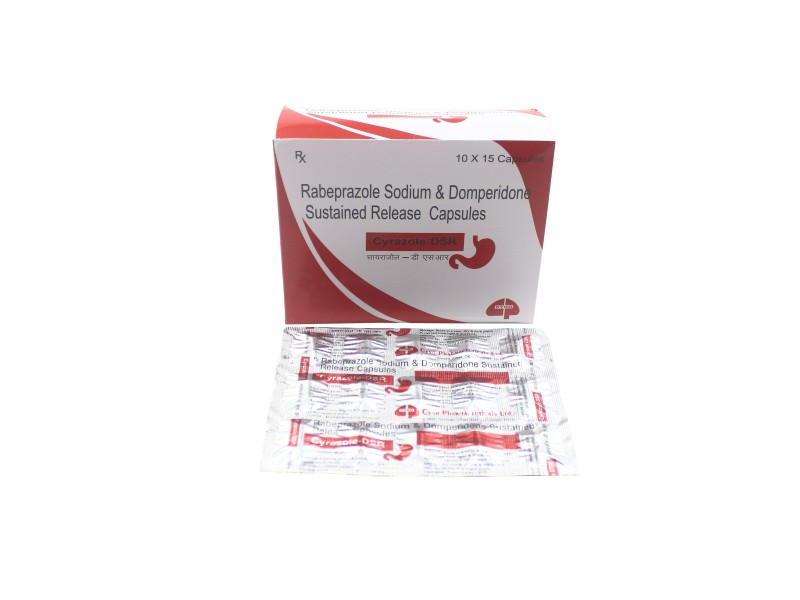Cyrazole DSR
Rabeprazole sodium (20mg), Domperidone (30mg)
Cyrazole DSR Capsule is a gastrointestinal medicine composed of Rabeprazole and Domperidone. Together they reduce the amount of acid your stomach makes and decrease the symptoms of nausea and vomiting. It treats symptoms of acid reflux due to hyperacidity, stomach ulcer, and Zollinger Ellison syndrome. Besides this which is used short-term to treat symptoms of gastroesophageal reflux disease (GERD).
Rabeprazole is widely utilized to prevent and heal gastrointestinal (stomach and guts) problems, which is caused due to overmuch stomach acid. Rabeprazole is a proton pump inhibitor, sometimes identified as an ulcer healing drug. This is also very beneficial for inhibiting secretion and gastric from the stomach as well as to treat various acid related gastrointestinal conditions.
Domperidone is a dopamine antagonist with anti-emetic properties domperidone does not readily cross the blood-brain barrier. Its anti-emetic effect may be due to a combination of peripheral effects and antagonism of dopamine receptors in the chemoreceptor trigger zone, which lies outside the blood-brain barrier in the area postrema.

Mechanism of action:
Rabeprazole: It is an antiulcer drug in the class of proton pump inhibitors. It is a prodrug – in the acid environment of the parietal cells it turns into active sulphonamide form. Rabeprazole inhibits the H+, K+ ATPase of the coating gastric cells and dose-dependent oppresses basal and stimulated gastric acid secretion.
Domperidone: The DA2-receptor antagonist domperidone antagonizes the inhibitory effect of dopamine, resulting in stimulation of gastric muscle contraction. This provides a mechanism for the gastro kinetic effect of domperidone.
Pharmacokinetics:
- Rabeprazole
- Absorption: Rabeprazole sodium is acid labile and formulated as an enteric coated tablet. It is rapidly, dose dependent, absorbed after oral administration. Food does not affect the absorption or the peak plasma concentration but delays the time to peak plasma concentration by about 1.5 hours. Bioavailability is not influenced by the co-ingestion of either food or antacids.
- Distribution: Rabeprazole is 97% bound to human plasma proteins.
- Metabolism: It undergoes extensive metabolism via non-enzyme metabolism to form major inactive metabolites (a thioether carboxylic acid metabolite and its glucuronide) and also minor metabolism by CYP2C19 and CYP 3 A4 to dimethyl and sulfone metabolites. Rabeprazole does not accumulate significantly during repeated administration.
- Excretion: Approximately 90% of the drug was eliminated in urine, primarily as thioether carboxylic acid; its glucuronide and mercapturic acid metabolites. The remainder of the dose is recovered in the faeces.
- Domperidone
- Absorption: Systemic bioavailability of oral domperidone is 13 – 17%, probably the result of hepatic first-pass and gut wall metabolism. The half-life is approximately 7.0 hours. Oral bioavailability is decreased by prior administration of cimetidine or sodium bicarbonate.
- Distribution: Domperidone is 91 – 93% bound to plasma proteins. It does not readily cross the blood brain barrier and therefore is not expected to have central effects. However, according to animal studies, very low amounts cross the placental barrier and it is excreted in the breast milk.
- Metabolism: Oral domperidone does not appear to accumulate or induce its own metabolism. It undergoes rapid and extensive hepatic metabolism by hydroxylation and N-dealkylation. In vitro metabolism experiments with diagnostic inhibitors revealed that CYP3A4 is a major form of cytochrome P-450 involved in the N-dealkylation of domperidone, whereas CYP3A4, CYP1A2 and CYP2E1 are involved in domperidone aromatic hydroxylation.
- Elimination: Urinary and faecal excretion amounts to 31 and 66%, respectively, of the oral dose. The proportion of the medicine excreted unchanged is small (10% of faecal excretion and approximately 1% of urinary excretion). The plasma half-life after a single oral dose is 7-9 hours in healthy subjects but is prolonged in patients with severe renal insufficiency.
Pharmacodynamics:
- Rabeprazole is a selective and irreversible proton pump inhibitor, suppresses gastric acid secretion by specific inhibition of the H+, K+ -ATPase, which is found at the secretory surface of parietal cells. So, it inhibits the final transport of hydrogen ions (via exchange with potassium ions) into the gastric lumen.
- Domperidone is a specific blocker of dopamine receptors. It speeds gastrointestinal peristalsis, causes prolactin release, and is used as antiemetic and tool in the study of dopaminergic mechanisms.
Precautions:
- Do not use rabeprazole together with medicines containing rilpivirine. Using these medicines together may cause unwanted side effects.
- Rabeprazole may cause a serious type of allergic reaction when used in patients with conditions treated with antibiotics.
- Taking this medicine for a long time may make it harder for your body to absorb vitamin B12.
- This medicine may cause hypomagnesemia (low magnesium in the blood).
- This medicine may increase your risk for fundic gland polyps (abnormal tissue growth in the upper part of your stomach).
- Make sure any doctor or dentist who treats you knows that you are using this medicine. You may need to stop using this medicine several days before you have medical tests.
Side effects:
- An adult taking Cyrazole DSR might have common side effects like rash, brittle bones, low vitamin B-12, loss of libido (sexual desire), cough, sore throat, runny nose, flatulence (gas formation), backpain, weakness or loss of strength, sleeplessness, headache, dizziness, and benign polyps in the stomach.
Dosage:
- Adult dosage (ages 18 years and older)Typical starting dosage: 60 mg once daily.
Dosage increases: Your doctor will increase your dosage as needed.
Maximum dosage: 100 mg once daily, or 60 mg twice daily. - Child dosage (ages 0–17 years)It hasn’t been confirmed that rabeprazole is safe and effective to treat stomach acid problems in people younger than 18 years.
Over dosage:
- Check with your doctor immediately if you or your child has stomach cramps, bloated feeling, watery and severe diarrhea which may also be bloody sometimes, fever, nausea or vomiting, or unusual tiredness or weakness. This medicine may increase your risk of having fractures of the hip, wrist, and spine. Symptoms of overdose may include drowsiness, confusion, mood disorders, altered consciousness. Seek urgent medical help if you suspect an overdose.
Warning:
- Do not use rabeprazole together with medicines containing rilpivirine. Using these medicines together may cause unwanted side effects.
- Rabeprazole may cause a serious type of allergic reaction when used in patients with conditions treated with antibiotics.
- Taking this medicine for a long time may make it harder for your body to absorb vitamin B12.
- This medicine may cause hypomagnesemia (low magnesium in the blood).
- This medicine may increase your risk for fundic gland polyps (abnormal tissue growth in the upper part of your stomach).
- Make sure any doctor or dentist who treats you knows that you are using this medicine. You may need to stop using this medicine several days before you have medical tests.
Duration of action:
- Inhibition of basal and food stimulated acid secretion 23 hours after the first dose of rabeprazole sodium are 69 % and 82 % respectively and the duration of inhibition lasts up to 48 hours.
Drug- drug interactions:
- Cyrazole DSR may interact with a blood thinner (clopidogrel, warfarin), antifungal (ketoconazole, voriconazole, itraconazole, fluconazole), anti-HIV drug (atazanavir, amprenavir, nelfinavir), antacid (magnesium hydroxide, aluminium hydroxide, cimetidine), iron supplements, antibiotics (clarithromycin, erythromycin, ampicillin, rifampicin), heart medicine (atropine, digoxin, amiodarone), blood pressure-lowering medicines (diltiazem), anti-cancer drug (methotrexate) and anti-nausea pills.
Adverse reactions:
- During sexual activity, if you feel dizzy or nausea, or have pain, numbness or tingling in your chest, arms, neck, or jaw, stop and call your doctor immediately. You can have serious side effects of Avanafil.
Pregnancy:
- It is not known whether Cyrazole DSR affects the baby or not. So, contact a doctor before intake of Cyrazole DSR.
Fertility:
- There was no effect on sperm motility or morphology after a single 200 mg oral dose of avanafil in healthy volunteers. In a clinical trial conducted in healthy volunteers and adult men with mild erectile dysfunction, daily administration of avanafil 100 mg oral dose over a period of 26 weeks was not associated with any unpleasant effects on sperm concentration, count, motility or morphology.
Contraindications:
- Patients who have suffered from an infarction, stroke, or life-threatening arrhythmia within the past 6 months; Patients with resting hypotension (blood pressure <90/50 mmHg) or hypertension (blood pressure> 170/100 mmHg); Patients with unstable angina, angina with sexual intercourse, or congestive heart failure are classified as New York Heart Association Class 2 or higher. Patients with severe hepatic impairment (Bal-Pugh C). Patients with severe renal impairment (creatinine clearance <30 mL / min). Patients who have vision loss in one eye because of non-arterial anterior ischemic optic neuropathy (NAION), regardless of whether this episode was in association with previous PDE5 inhibitor risk. Patients with known hereditary degenerative retinal disorders. Patients who are using potent CYP3A4 inhibitors (ketoconazole, ritonavir, atazanavir, clarithromycin, indinavir, itraconazole, nefazodone, nalfinavir, saquinavir and telithromycin).
Storage:
- Store the medicine in a closed container at room temperature, away from heat, moisture, and direct light. Keep from freezing.
- Keep out of the reach of children
Breastfeeding:
- Domperidone present in Cyrazole DSR passes into the breast milk. However, no evidence of risk has been reported. Please consult your doctor before intake of Cyrazole DSR.
